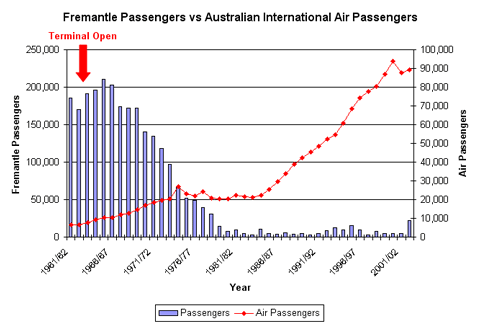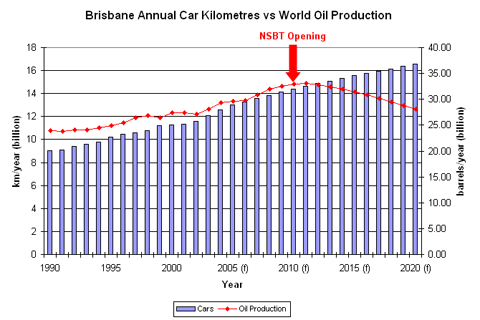Today's traffic problems in Australia’s fastest growing city, Brisbane, result from decades of neglect by a succession of state and local governments. Not long after being elected into office in 2004 on a platform of alleviating the city’s traffic congestion, Brisbane Lord Mayor Campbell Newman announced that Brisbane City Council would proceed with Queensland's largest public-private partnership to construct the North South Bypass Tunnel (NSBT), part of his TransApex project. From the outset, Newman has seen his role as “getting on with the job of reducing traffic congestion problems in Brisbane". Unfortunately Newman made one flawed assumption that plagued the project’s planning from the beginning and will soon likely see its demise – cheap oil.
Cheap oil has proved costly for previous transport infrastructure investments. Among these is the Fremantle Passenger Terminal, built in the early 1960s at a cost of £1.5 million, approximately $30 million in today’s dollars, to accommodate growing demand from passengers arriving from Europe during the "populate or perish" immigration era. What Western Australia’s planners did not foresee was that growing world production of cheap oil was simultaneously triggering the explosion of cheap international air travel. Within 15 years passenger arrivals plummeted to two per cent of their 1965 peak and the facility became largely redundant.
Passenger Numbers at Fremantle Passenger Terminal, 1961-2001
Advertisement

Here in Brisbane, the transition from growing production of cheap oil to declining production of expensive oil has been completely ignored in the planning for TransApex and the NSBT. Forecasts of increasing car traffic in the various feasibility studies, which have omitted any consideration of rising fuel prices, are highly unlikely to eventuate. Neither will pipe dreams of quickly replacing Australia’s car fleet with hybrid, ethanol or hydrogen cars, which take no consideration of the time, scale, economics or thermodynamics involved in such a transition.
The idea of 'market-driven' transition to increased vehicle fuel efficiency is itself without historical basis. Today's cars are only marginally more fuel efficient than those of the 1960s, indeed average fuel efficiency for new cars has actually worsened in the last five years as Australians continue to buy larger, heavier cars in an era of skyrocketing private debt and perverse tax policies that encourage increasing mileage an d consumption. The absurd fixation on building motorways to solve traffic congestion despite the imminent reality of peak oil is best described by James_Howard_Kunstler:
We are now hobbled by a tragic psychology of previous investment – that is, having poured so much of our late-20th century wealth into this living arrangement – this Happy Motoring utopia – we can't imagine letting go of it, or substantially reforming it.
Brisbane Annual Car Kilometres vs World Oil Production
Advertisement

The "can do" attitude towards building the NSBT despite clear evidence of the imminent peak in world oil production is nothing short of astonishing. When the initial feasibility study was completed in early 2005, Newman and Premier Peter Beattie appeared at a joint press conference in which Beattie offered BCC a loan of up to $450 million, stating that "The government supports the project, provided assumptions in the business case do not change in any way that would jeopardise state taxpayers' dollars". Yet the business case assumptions were invalidated by BCC planners long before the detailed feasibility study was finished. Unfortunately these concerns were ignored and contracts were signed which do jeopardise taxpayers’ money.
BCC decided to press on and close the deal on 31 July 2006. Shrouded in secrecy at the time, the contract with the RiverCity Motorway Group was signed on 7 August 2006, committing ratepayers to a $292 million completion fee, in addition to more than $100 million already committed for the flawed feasibility studies, legal fees and administrative costs. Costly indeed for a project in which the risks are supposed to be borne by the private sector.
This is an edited version of an article that was first published on The Oil Drum: Australia/New Zealand.
Discuss in our Forums
See what other readers are saying about this article!
Click here to read & post comments.
7 posts so far.